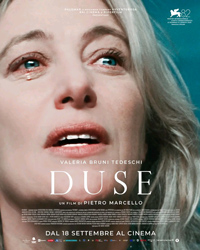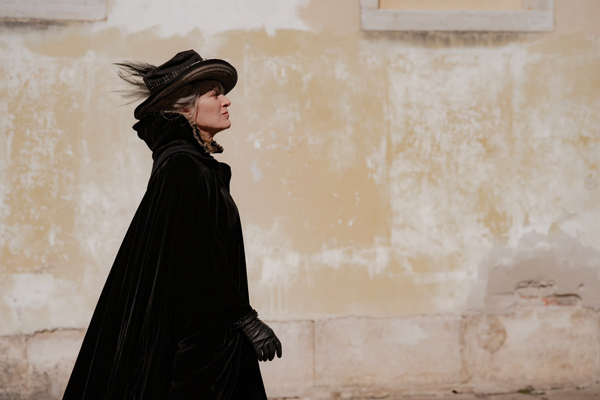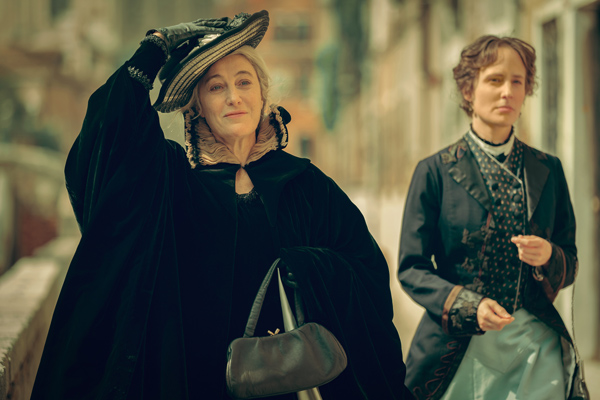Distress Becomes Her: Marcello Delivers a Diva’s Final Act
 For many, Duse, the latest feature from Italian director Pietro Marcello, will serve as their introduction to famed Italian stage star Eleonora Duse, who was revered in the same period as performing contemporaries such as Sarah Bernhardt, Isadora Duncan, and Alla Nazimova. But Duse was Italy’s premiere stage legend in the early 1900s, where she also toured in the US, retiring from her craft in 1909. But when the Bank of Berlin collapses, Duse’s financial realities at the end of WWI force her to reconsider turning to the stage, and it’s this period Marcello explores, as she suffers from tuberculosis and becomes re-obsessed with acting only three years before her death in 1924. As portrayed by Valeria Bruni Tedeschi, it’s a strangely demure depiction of extravagance and disillusionment by a woman desiring to live excessively or not at all.
For many, Duse, the latest feature from Italian director Pietro Marcello, will serve as their introduction to famed Italian stage star Eleonora Duse, who was revered in the same period as performing contemporaries such as Sarah Bernhardt, Isadora Duncan, and Alla Nazimova. But Duse was Italy’s premiere stage legend in the early 1900s, where she also toured in the US, retiring from her craft in 1909. But when the Bank of Berlin collapses, Duse’s financial realities at the end of WWI force her to reconsider turning to the stage, and it’s this period Marcello explores, as she suffers from tuberculosis and becomes re-obsessed with acting only three years before her death in 1924. As portrayed by Valeria Bruni Tedeschi, it’s a strangely demure depiction of extravagance and disillusionment by a woman desiring to live excessively or not at all.
Dire financial realities revive Eleonora Duse’s interest in returning to the stage in 1921, where her name still conjures the acclaim of her past. Reassembling a theater troupe, she drives herself further into debt by reviving Ibsen’s The Lady from the Sea, the response reawakening her full fledged hunger for acclaim. But times have changed after the end of the war, and her country has begun its slide into Fascism with the rise of Benito Mussolini (Vincenzo Pirrotta), a confidante with her ex-lover, the playwright Gabriele D’Annunzio (Fausto Russo Alessi). As she blindly commissions the staging of new material, her health begins to decline, leading her estranged daughter Enrichetta’s (Noemie Merlant) attempts to wrestle her away from the life of the stage, and finally usurp her mother’s affections from dutiful assistant Desiree von Wertheimstein (Fanni Wrochna).

Like with Martin Eden (2019), Marcello employs an anachronistically styled electronic score (collaborating once more with Sacha Ricci and Marco Messina, who are joined by a third composer, Fabrizio Elvetico) which enhances the internal vibrations of the larger-than-life appetite of its protagonist. Colorized archival footage of the period, reflecting the visible signs of Fascism changing the landscape, attempts to bolster the vibrancy of the palette, though these visual segues often feel transposed upon the narrative of a character who’s completely oblivious to what’s going on around her. Duse’s renewed lust for stardom unfortunately arrives at an inopportune moment, an artist forced into aligning herself with the rising far-left out of convenience. But Duse is doomed either way.

Curiously, Marcello’s approach feels rather sedate, the energy dissipating to the beat of Eleanora’s own health. More interesting elements in the side plot, such as her biological daughter forced to compete for her mother’s attention with slavish assistant Desiree, proves to hold more interest than the wishy-washy depiction of her reunion with D’Annunzio, whose political leanings assist in endearing her to Mussolini.
Noémie Lvovsky (2023’s Scarlet – read review) in walks away with one of the film’s best scenes as the one-legged, outspoken Sarah Bernhardt, rejecting the artifacts of pre-War theater in favor of art speaking directly to the times. This leads to Duse’s strange, misheaded championing of a novice playwright (Edoardo Sorgente) and his pretentious metaphorical play Hecuba in the Trenches, which seems to seal Duse’s fate as a performer. The tone feels like a dress rehearsal for either a tragedy or a comedy, but the material can’t ultimately decide what angle it prefers. What we’re left with is an entertainingly difficult Tedeschi, who is often manically, exhaustingly prickly, dependent upon Desiree like Ryan Murphy’s version of Joan Crawford and her faithful maid Mamacita. All the ingredients are there to make this a femme-focused Italian version of Sunset Boulevard (1950) or even the Sally Kirkland led Anna (1987), but this is the portrait of a compromised artist refusing to read the writing on the wall.
There are further hints of encroaching darkness, with a queer member of Duse’s troupe (Vincenzo Nemolato) subjected to various instances of homophobia, but those expecting the frankness of Marcello’s 2009 title The Mouth of the Wolf might be disappointed by its triviality here. Considering the subject matter, an air of something like Truffaut’s The Last Metro (1980) would have assisted in buoying Duse’s energy. Instead, this often feels as if Marco Bellocchio put Cassavetes’ Opening Night (1977) in a straitjacket. Merlant, bless her, is eclipsed once again as the appendage of a more powerful woman’s gravitational pull, and the bitter competition with Fanni Wrochna is mostly reduced to cold stares when these are the two characters who likely should have been allowed a screaming match.
Still, Duse accomplishes something of its intention, a frustrating film about a difficult woman who may never have heard of Stanislavsky but certainly embodied his mantra, “It’s all about the work.”
Reviewed on September 3rd at the 2025 Venice Film Festival (82nd edition) – In Competition. 122 Mins.
★★★/☆☆☆☆☆


